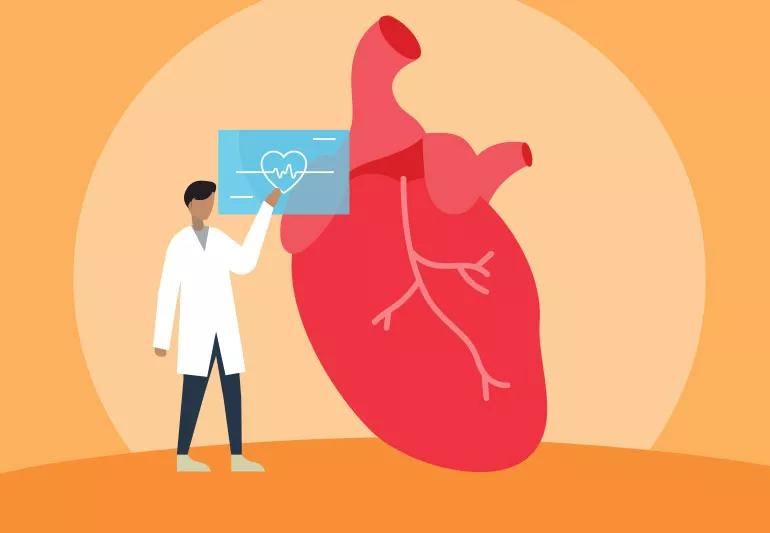Advertisement
Understanding DD and what it means for you

Your heart has the ability to relax after each beat. When your heart isn’t able to relax fast enough, it’s called diastolic dysfunction (DD). DD is dangerous and is believed to be associated with congestive heart failure symptoms in patients who have what’s called preserved left ventricular ejection fraction, according to cardiologist Wael Jaber, MD.
Advertisement
Cleveland Clinic is a non-profit academic medical center. Advertising on our site helps support our mission. We do not endorse non-Cleveland Clinic products or services. Policy
DD has long been associated with pulmonary hypertension, pulmonary edema and valve disease.
If you have DD, you have an increased risk of death — even if your systolic function is normal and you have no other problems with how your heart is functioning, according to a study co-authored by Dr. Jaber. If your systolic function is normal, that means that the left ventricle of your heart can contract completely and properly pump blood through your body.
Dr. Jaber notes that the isolated DD relaxation problem with the heart even in the setting of normal systolic pumping function carries a significant risk for death.
Research by Dr. Jaber and his team also suggests that increased awareness among heart doctors of how significant advanced DD is may help the condition be identified earlier in those who are at risk, especially before they’ve developed any symptoms.
Here Dr. Jaber explains why diastolic dysfunction raises death risk and what preventative measures to take if you’re at risk.
Although all types of heart failure aren’t preventable, there are still steps you can take to lower your risk of conditions that can lead to DD. If you show symptoms of DD, your doctor will grade it as mild, moderate or severe.
According to research done on DD and heart disease risk, asymptomatic DD (meaning it doesn’t cause any symptoms) is common in the general population, even in patients without heart failure. It increases with age and is prevalent among older women with systemic hypertension and ventricular hypertrophy. Diastolic dysfunction is linked to excessive weight, diabetes, age and limited physical activity or a sedentary lifestyle.
“The heart becomes less efficient at relaxing as we get older,” explains Dr. Jaber. “When patients come in to get an ultrasound of the heart (echocardiogram) after experiencing symptoms such as shortness of breath, they should ask about both pumping and relaxation.”
Quitting smoking, limiting alcohol intake, dietary changes, weight loss and aggressively controlling hypertension, high cholesterol and coronary artery disease are effective measures you can take to prevent DD.
Frequent exercise and managing diabetes should be considered as well, says Dr. Jaber.
Advertisement
You should check with a cardiologist to determine the cause of the abnormal relaxation. It may be a signal that other problems could be brewing. Assessing your diastolic function may help in diagnosing heart failure, Dr. Jaber says.
“Before, when a patient would come in with abnormal heart relaxation, the meaning or risk of this was unknown,” he says. “Now we know that diastolic dysfunction is not an innocent bystander. It translates into higher death rates and should not be ignored.”
Advertisement
Learn more about our editorial process.
Advertisement

Factors like temperature, energy levels and sleep quality play a role in determining whether working out in the morning or evening is best for you

Obesity, age and preexisting heart conditions can all raise your risk of cardiovascular disease during pregnancy

Xylitol in processed food can increase risk of heart attack and stroke — but there’s no danger in xylitol in oral care products

If your provider has ruled out a serious cause, you can treat chest pain at home with antacids, inhalers or anti-inflammatory medications

Walking is a great goal, but how many steps are best for you depends on factors like your fitness level and age

Research shows a strong association between rheumatoid arthritis and heart issues

Eating more natural, whole foods can lower your risk of heart and cardiovascular diseases

First things first — slowly sit or lie down

Focus on your body’s metabolic set point by eating healthy foods, making exercise a part of your routine and reducing stress

PFAS chemicals may make life easier — but they aren’t always so easy on the human body

While there’s little risk in trying this hair care treatment, there isn’t much science to back up the claims